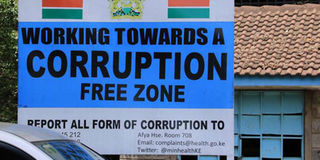Corruption the biggest obstacle to economic growth, job creation

This image taken on October 28, 2016 shows a banner outside the Ministry of Health warning against corruption. Corruption is like a debilitating disease that eats away at a country and its institutions. PHOTO | JEFF ANGOTE | NATION MEDIA GROUP
What you need to know:
- The President must ensure that all those working for him operate in an honest and dedicated manner.
- The price paid for corruption should be made high enough so that it becomes a deterrent.
In my previous piece, I argued that there were various obstacles or handbrakes on economic development and job creation that should be tackled along with more proactive measures.
We hear a lot about creating infrastructure to pave the way for more economic activity and jobs but, we need to look at the impediments confronting economic and commercial activity.
Arguably, the biggest of these is corruption, which spans the economic, social and political landscape like a colossus.
POLICE
One need go no further than the recent release of Transparency International’s 2017 East African Bribery Index.
Unsurprisingly, the highest ranked institution in the Kenyan context is the Kenya Police Service, where 69 per cent of respondents said they either offered a bribe or were induced to pay one.
The recent cartoon of a police officer telling the Central Bank Governor that the new Sh50 note should carry “the images of our traffic police officers” is a cynical reminder of the reality.
BRIBERY
Other entities where bribery in the public service is rampant is in the Judiciary and various land services, at 44 per cent and 41 per cent, respectively.
Even more depressing is that the study concluded the size of the bribe had increased significantly.
Let us go beyond the figures and remind ourselves that corruption is like a debilitating disease that eats away at a country and its institutions.
This, in turn, reduces the effectiveness and capacity of many of these very institutions that are in theory there to serve the people.
PUBLIC SERVICES
On a more anecdotal level, how many times have we heard people saying that they failed to ask the police to investigate some irregularity or misdemeanour because it was largely a waste of time.
Indeed, in many cases, any report that is made to the police is largely for the purpose of getting a signed and stamped abstract form.
Another way to look at it is to see how much time, energy and money is diverted to paying for even the minimum of public services that are simply not delivered or are way below standard.
These are often services being funded by the taxes of the very same citizenry.
EMPLOYMENT
Purely and simply, this is negative energy and the blatant hijacking of resources, which literally should be going into more productive activities.
There is the argument that it takes two to tango and the average Kenyan is compliant enough to participate in such activities to get by.
That has some truth in it, but so does the fact that it is often very difficult to get on with one’s life without giving in to extortion.
The end result is that it reduces economic growth by a percentage point or two, which, in turn, affects job creation opportunities.
AUDITS
The President must lead from the front and ensure that all those working for him operate in an honest and dedicated manner.
Any deviance from this simple principle should be met with dismissal.
This may appear an obvious thing to say but there have been too many instances where it happened later rather than sooner or not at all.
Much more needs to be put into the method of lifestyle audits and forensic information on public servants.
VETTING
Section 27(5) of the Public Officers Ethics Act needs to be beefed up.
The principle of random lifestyle audits on public servants needs to become the norm.
For all its weaknesses, the vetting of police officers showed the value of such an exercise.
We have seen a flurry of county government appointments and some questions on the suitability of several of them.
This is why the audit of public officers should become more holistic preferably by an independent entity.
ETHICS
The price paid for corruption should be made high enough so that it becomes a deterrent and it should be paid by both the ‘giver’ and the ‘taker’.
The country faces huge challenges and hurdles, one of the greatest of which is corruption.
We need to take steps to reduce the former so the latter is much less attractive.
The dividend in terms of a more vibrant economy would be enormous.
Mr Shaw is a public policy and economic analyst and a former member of the Board of Transparency International Kenya. [email protected]





